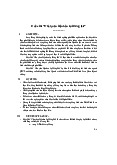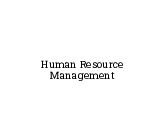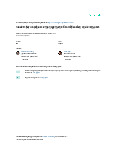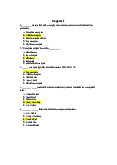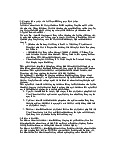


Preview text:
CHAPTER 4. APPLICATION *3 Decision Making, Saudi Style
Businesses operating in the Middle East often fail to appreciate the distinctive
cultural differences in many Saudi Arabian-based businesses. Decision making can
take longer because many of the companies are family owned, and the tradition is
for the family to thoroughly discuss a particular proposition before committing the business to it.
Equally, the chief executive is often also the head of the family, and securing time
with this individual may be difficult. Saudi Arabia has what could be called a
merchant, or trading, culture. Long before the discovery of oil, the Saudis were
shrewd negotiators. Saudi company hierarchies can be fairly rigid, and employees
operate with clear lines of authority. In recent years, the pace of business has
accelerated, but decision making can still be a slow and deliberate process.
Decision makers will consult widely within the organization if they are unsure
about how the decision will affect the best interests of the company. In this respect
navigating several layers of approval and support may be necessary before a decision is finally made.
In some cases in Saudi Arabia, the decision making can be delegated down the
organization, but the decision will still need the overall support of the
organization’s senior executives. Decisions are often made with reference to the
specific situation rather than an all-encompassing set of rules or laws.
In many cases, personal feelings and experiences are more important in decisions
than simple objective and empirical data. To make a risky decision, decision
makers need to feel comfortable with that decision and may be more willing to
make the decision if they trust those involved.
Ahmed Youssef of the global management consultancy Booz & Company believes
that a major issue facing Saudi family businesses is making the choice as to who
traditionally takes leadership positions in the business and those who may be more
capable of fulfilling such roles. This problem cuts to the heart of the issue of
decision making. Added to this are the issues of the business being expected to
support an ever-increasing number of family members and that many businesses
have diversified well beyond their original core competences.
Decision making, according to Youssef, will have to be faster and more focused,
especially given the fact that many of the countries in which these merchant family
businesses operate arc now more open to competition from overseas business than
ever before. A survey carried out by Booz discovered that many of the Saudi
businesses were involved in as many as three different sectors of industry; this
diversification too made it difficult to coordinate decision making and planning.
The suggestion from the consulting firm is that businesses should divest
themselves of some of the ventures unrelated to core activities and concentrate on
reinvestment in core businesses. In this way, decision making can be more focused
and streamlined. What does all this mean for the non-Saudi? It entails a
slightly different approach to the decision-making process and negotiations:
1. Friendship and business are nearly always interlinked and based on mutual benefit.
2. Scheduled meetings are often moveable due to Saudis’rather relaxed attitude about precise times.
3. The working week starts on Saturday: prayer times and religious holidays need to be taken into account.
4. Meetings can take on the appearance of being disorganized; personal and
business matters are closely interlinked.
5. With the Saudi business being hierarchical, decision making is reserved for
senior management. It is often the case that the manager who will ultimately make
the decision will be the one who contributes the least in a meeting.
6. Meetings can take a long time, so decisions may take time, which reflects the
bureaucratic nature of Saudi businesses. Impatience can be seen as a weakness.
Several attempts have been made to typify the way in which Saudi Arabian
businesses, and decision making, operate.
It could be said that Saudi Arabian businesses are inherently conservative and that
formality and respect are extremely important. it is also vital to understand an
individual’s role and the existing hierarchy of a business. Saudi Arabian businesses
adopt an inherently low risk strategy and adapt slow'ly to change.
Decision making tends to involve all major stakeholders. Once a decision has been
made, subordinates will implement it without question. Business is considered to
bo a personal task, and agreements are often made face-to-face. Decisions may rely
on several layers of approval, which is not to say that Saudi Arabian business
representatives are not tough negotiators.
The mere fact that the businesses are hierarchical does not mean to say that every
tiling is not negotiable. Some analysts— looking at Saudi business models and
decision making—suggest a shift from top-down leadership and a transfer of
family businesses to younger family members, aided by independent, professional
managers. They feel that the family business model and the associated decision-
making processes are under stress. They also note an overreliance on the size of the
balance sheet, rather than the size or the growth of market share. Some Saudi
businesses are adapting and accepting a more bottom-up leadership style, rather
than a more paternalistic one. Others are struggling with structural issues and seem
reluctant to change. Despite the readily apparent differences, according to the
World Bank, Saudi Arabia was rated thirteenth out of 183 countries in terms of
general ease of doing business (World Bank,2009). Certainly business models have
shifted to include more privatization, which has led to consultancy services being
used. Nonetheless Saudi Arabian business culture is complex and still
retains many customs and traditions. Discussion Questions
4-25 How might the Saudi business model and decision-making
differ from, for example, those in Europe or in China?
4-26 Is Saudi business decision making primarily based on certainty, risk, or uncertainty? Explain.
4-27 Do you see evidence of groupthink in Saudi Arabian business decision making?
4-28 What are the comparative advantages and disadvantages to
Saudi Arabian businesses in changing the way in which they make their decisions?
4-29 How might Saudi Arabian decision-making processes be seen
as an advantage to Saudis and a disadvantage to overseas
customers, suppliers, or partners?
